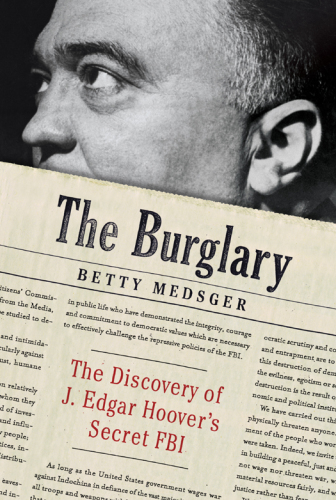
The Burglary
The Discovery of J. Edgar Hoover's Secret FBI
کتاب های مرتبط
- اطلاعات
- نقد و بررسی
- دیدگاه کاربران
نقد و بررسی

November 11, 2013
When a huge trove of classified documents was stolen from the Media, Pa., branch office of the FBI in 1971, Medsger (Women at Work) was one of the first journalists to cover the story. Four decades later she has tracked down the perpetrators, whose identities had never before been revealed, and written the definitive account of what she calls “perhaps the most powerful single act of nonviolent resistance in American history.” The burglary revealed to the public how the Bureau served as “secret judge, secret jury, and secret warden” in its efforts to “intimidate people from exercising their right to dissent.” The richly detailed narrative flows seamlessly from the planning and commission of the break-in to the FBI’s bungled investigation to the explosive aftermath of the files’ release. In its zeal to bring the perpetrators to justice, the FBI provided much support for the Camden 28, mistakenly believed to have committed the Media burglary as well, to rob a draft board—an attempted sting that became instead a watershed moment for the antiwar movement when the defendants were acquitted by jury nullification. Medsger concludes by following up with each of the plotters, most of whom have since enjoyed quiet lives since, unlike those who have appropriated classified files more recently.

January 1, 2014
Ambitious, meticulous account of a successful burglary of the FBI, during a different time of controversy regarding governmental surveillance. In 1971, Washington Post reporter Medsger was surprised to receive pilfered FBI documents from "The Citizens' Commission to Investigate the FBI." While the break-in at the FBI's satellite office in Media, Penn., had garnered minimal attention, the release of the documents to journalists and politicians caused a national furor. At the time, bitterness over Vietnam fueled suspicion among activists of covert governmental harassment. Several disciples of the Catholic peace movement came together as the "Commission" and hatched the audacious plan following similar actions at draft boards, which combined subterfuge with a commitment to nonviolent resistance. The deftly executed burglary soon became longtime FBI Director J. Edgar Hoover's "worst nightmare," in that the documents revealed that the FBI had aggressively harassed leftists, blacks and civil rights activists since the 1940s and kept tabs on many others, although Hoover's inner circle had long claimed "there were no FBI files on the personal lives of government officials or other prominent people." As the files were released to the Post and elsewhere, mainstream outrage prefaced that which greeted the impending Watergate scandal. Remarkably, the burglars were never caught, though Hoover's FBI pursued them doggedly, even interviewing an activist who'd quit before the burglary without realizing his significance. Years later, Medsger found they'd generally lost touch with each other and their radical past: As one told her, he was shocked to see in a documentary that "somebody apparently thought that our little action was that important." Yet, as the author points out, comparisons to post-9/11 America and recent revelations about the National Security Administration are inescapable. Medsger captures the domestic political ferment of the 1970s on a large canvas, though the narrative's extreme detail and depth occasionally make for slow going or repetitive observations.
COPYRIGHT(2014) Kirkus Reviews, ALL RIGHTS RESERVED.

January 1, 2014
The 1971 burglary of an FBI office in Media, PA, set off a chain of events leading to the investigation, and attempted reform, of the Bureau itself. This detailed history of that time period presents the burglary as an exemplar of civil disobedience, ably setting it in politico-historical context. Medsger covered the burglary as a reporter for the Washington Post, and her personal involvement lends credence and added weight to the narrative, which is extremely topical post-Snowden. The author (Winds of Change; Women at Work) occasionally repeats or leaves out details, the former presumably for dramatic effect and the latter presumably because she assumes readers know who the Watergate Plumbers were. This is unfortunate, as the events in question--the burglary in particular--are compelling enough on their own merits not to require deliberate narrative flourishes, and a history that takes such pains elucidating intricacies should not lose readers on account of leaving some out. VERDICT Students of American history and civil rights will be momentarily gratified to learn that, in the past, revelations of massive, secret government spying motivated good citizens to action.--Ricardo Laskaris, York Univ. Lib., Toronto
Copyright 2014 Library Journal, LLC Used with permission.

January 1, 2014
In 1971, somebody burgled an FBI office in Pennsylvania, stole secret files, and sent them to journalists. One of the recipients, Medsger revisits the story because she has discovered who the burglars were (the FBI never identified them). Organized by a college teacher, they were a small group of academics and students whose act Medsger recounts with sympathy for their audacity and antiwar motivations. In discursive detail, Medsger recounts the protester-burglars' movements, from casing the building to publicizing the purloined documents (with interludes of their worries about their fates if caught), and follows the course of the futile FBI investigation into the caper. Besides dramatizating the incident, Medsger pursues its historical significancethe documents' revelation of extensive domestic surveillance by the FBIinto the congressional investigations of the 1970s. Medsger also discusses J. Edgar Hoover's appointment in 1924 and NSA activities in the present. Though it could have been more tightly organized, this work encapsulates an important event of interest to readers of the history of the antiwar movement.(Reprinted with permission of Booklist, copyright 2014, American Library Association.)

























دیدگاه کاربران